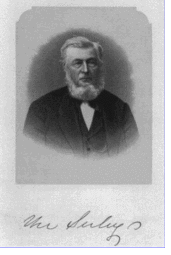Uri Seeley
Personal
Gender: Male
Date of Birth: May 25, 1771
Date of Death: August 10, 1877
Birth Place: Fairfield County, CT
Death Place: Lake County, OH

Personal
Gender: Male
Date of Birth: May 25, 1771
Date of Death: August 10, 1877
Birth Place: Fairfield County, CT
Death Place: Lake County, OH

SEELEY, URI, pioneer and farmer, was born in Weston, Fairfield county, Connecticut, May 25th, 1971, and died on the 10th August 1877, in Lake county, Ohio. He was the son of Ebenezer Seeley, a farmer of Weston. The family was of Welsh origin, three brothers having come over among the early settlers. One of the three was killed in the French war; another became governor of New Jersey, the third was the ancestor of Ebenezer Seeley. The line has produced some men of note and character. From an early age until his twenty-third year he worked on his father’s farm. In 1815, he left his father’s home with the purpose of making a home for himself in the West. Ohio was then, as it had been for some years, the place to which Connecticut emigrants bent their steps. He settled in Painesville, which then formed part of Geauga county, on the same farm he continue to occupy until his death. He labored energetically in the improvement of his farm, and with so much success that he added to his possessions and in time secured a comfortable competency. His position as a prominent farmer and landowner and his native strength of character, gave him influence among his fellow settlers, and in 1824, he became sheriff of Geauga county, holding the position for four years, which were the constitutional limit.
The county was at that time the theatre of a fierce political struggle between the faction that was in power and their opponents, the leaders of that faction having formed a combination to control the county offices. Into this struggle he threw himself with all the force of his character, and became a leader of the opposing party. The fight was carried on with so much bitterness that for fifteen years his family were in fear of serious personal violence being done him. Overtures were made to secure his adhesion to the faction in power, or to silence his opposition, but without avail. Other means were then resorted to. An official of the court having to make out a writ of commitment to the penitentiary for a convicted counterfeiter named Seeley, entered his name in the writ, thereby causing him embarrassment and annoyance. The proper correction was made as soon as attention was called to what was pretended to be a mistake. He was then threatened with a crushing blow which would bankrupt him and drive him from his home, but he refused to yield. He took an active part in the work of suppressing gambling, a vice very prevalent at that time, and a case arose which resulted in a decision by the Supreme Court that the sheriff of a county could, as a peace officer, arrest a person and place him under bonds without going before a magistrate, and that the law made it the duty of the sheriff” to arrest a disturber of the peace. He had been assaulted by a prominent member of the bar, whom he then had arrested and placed in jail. The court held him justified in so doing. He also recovered $50 damages in a civil suit for the assault, and successfully defended two suits brought against him by his opponent for false imprisonment. He was elected to the State senate of 1832-33, being nominated by the Anti-Jackson party and as the enemy of the dominant local faction.
The combination against which he had so long fought being now broken up, he refused further political position and threw himself with all the energy of his character into the anti-slavery movement, and became the local leader and strongest worker in that contest. He was one of the officers of the famous “Underground Railroad,” and hundreds of escaped slaves were assisted by him to freedom. When the anti-slavery men formed themselves into a political party, he was nominated to represent Geauga and Ashtabula counties in the legislature. His anti-slavery sentiments were never abandoned or modified, and being a man of positive character and much ability and experience as a local politician, he was able to do much toward forming and leading the public sentiment of his locality in that direction. In political matters he was always independent and of conservative tendencies. He took an active part in the movement for the election of Horace Greeley, presiding at the Greeley meeting in his village, and voting for him. A man of much decision of character, strong native common sense, and of unswerving patriotism, he was well qualified to act as a leader in the early days of the State’s history. Of incorruptible principles, unflinching courage, and of fearless boldness, he won the respect of all, and obtained an influence which he turned to the public advantage. Quiet, unpretentious, and mild in his ordinary manner, he was at the same time firm, unyielding, and determined in his advocacy of what he believed to be right, and in his opposition of what he deemed to be wrong. As an active worker in the great anti-slavery cause, his long and effective labors received flattering recognition.
His religious affiliations were with the Congregational church, of which he was for many years a prominent and liberal member. He married July 12th, 1812, Miss Abbie Turney, who died in September, 1863, the mother of six children. In May, 1866, he married Miss Caroline Perry, of Easton, Connecticut.
Pages 386-387 ” Biographical Cyclopaedia and Portrait Gallery with an Historical Sketch of the State of Ohio”; Joseph Fletcher Brennan, Publisher: John C. Yorston & Co., Cincinnati, 1880.
[SGS # 1921 – Uriah/Uri (#1921); Ebenezer (# 606); (Nathaniel; Nathaniel; Nathaniel; Nathaniel; Nathaniel; Robert]